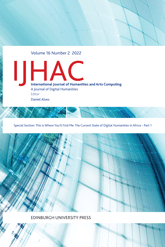
by Emmanuel Ngué Um
The main challenge facing Digital Humanities research in Africa is the race to catch up with a global trend, where digitization is increasingly present at the intersection of knowledge and society. This race is taking place at a time when knowledge and information are the commodities that determine the distribution of wealth. To further complicate this challenge, digitization tends to undermine the ideal of universalism that has underpinned the circulation of knowledge and granted it an a priori neutrality for so long. Moreover, the sometimes pronounced algorithmic – and linguistic – bias that characterizes the global supply of digital technology services and reifies already-dominant cultures, for example, in Natural Language Processing, exacerbates the reticence of marginal societies, particularly those of Africa, towards embracing these technologies wholesale. Under such circumstances, the uptake of Digital Humanities perspectives in Humanities and Social Science scholarship is still limited on the continent. This, however, contrasts with the general demand for education and more with the growth of a digital culture among the youth in most countries.
The last five years have spurred a digital momentum in several scientific and academic encounters in Africa and elsewhere that sought to explore and/or highlight ideas, views, policies, and affordances in applying digital technologies to humanities and social science research in Africa. The special section on Volume 16.2 of IJHAC provides a snapshot into the current state of Digital Humanities scholarship in the continent. The papers presented in this issue reflect two instances of Digital Humanities research in the continent in the present times: one humanistic, another positivist, with a computational orientation. Three papers fall into the first category, and two fall into the second category. The papers in the first category are typical humanities publications whose digital component prompts at some juncture in the research pipeline. In contrast, those in the second category endorse digitality as an episteme that anchors the research process from a perceptual representation of the objects, mobilization, organization, elicitation, analysis, and visualization of the resulting knowledge.

The International Journal of Humanities and Arts Computing focuses both on conceptual and theoretical approaches, as well as case studies and essays demonstrating how advanced information technologies can further scholarly understanding of traditional topics in the arts and humanities
Find out how to subscribe, recommend to your library, and sign up for Table of Contents alerts.





